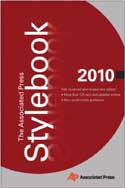The AP, apart from being a news organization, also publishes a highly influential stylebook used by schools and journalists across the country. And they have just made a pretty significant change to it.
Starting now, the AP Stylebook no longer supports the use of “illegal immigrant” to describe people living in the country illegally.
In fact, the AP Stylebook no longer allows for the use of the term “illegal” to describe any person. The word “illegal,” according to the AP, should only be used in reference to an illegal action – but not in reference to an actual person.
The AP had been using “illegal immigrant” for some time, after deciding that other popular terminology like “undocumented” failed to provide a credible alternative (they could have plenty of documents – just not the one that grants them citizenship).
Here’s what the Stylebook’s updated entry for “illegal immigration” says:
illegal immigration Entering or residing in a country in violation of civil or criminal law. Except in direct quotes essential to the story, use illegal only to refer to an action, not a person: illegal immigration, but not illegal immigrant. Acceptable variations include living in or entering a country illegally or without legal permission.
Except in direct quotations, do not use the terms illegal alien, an illegal, illegals or undocumented.
Do not describe people as violating immigration laws without attribution.
Specify wherever possible how someone entered the country illegally and from where. Crossed the border? Overstayed a visa? What nationality?
People who were brought into the country as children should not be described as having immigrated illegally. For people granted a temporary right to remain in the U.S. under the Deferred Action for Childhood Arrivals program, use temporary resident status, with details on the program lower in the story.
So, according to the AP, people can enter the country illegally, but they are no longer to be referred to as illegal immigrants.
The move is already sparking political debate, with conservatives upset. The Media Research Council, who says their job is “exposing and combating the liberal media bias,” called the move “politically correct mumble.” Others claim the move had a purely political motivation.
On the other side, the Congressional Hispanic Caucus called the decision a “great move forward.”
For their part, the AP says that it’s all about “ridding the Stylebook of labels.” For instance, another move nixed the term “schizophrenic” and replaced it with “diagnosed with schizophrenia.”
[Photo via Thomas Hawk, Flickr]

 The AP said the change from "Web site" to "website" was based on increasingly common usage both in print and online.
The AP said the change from "Web site" to "website" was based on increasingly common usage both in print and online.